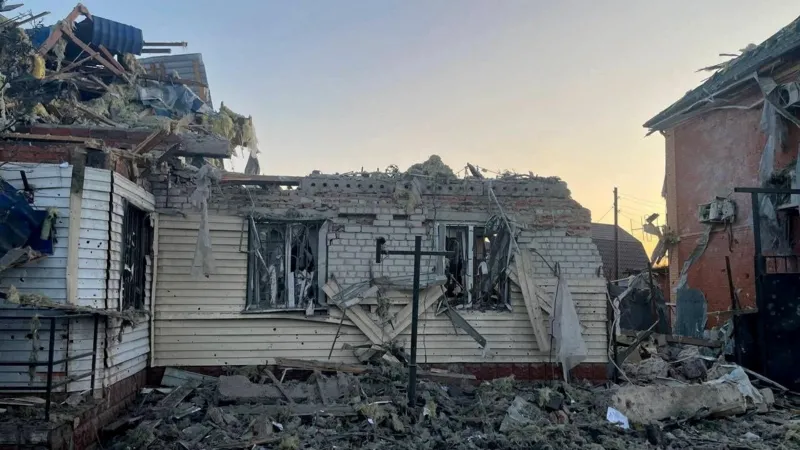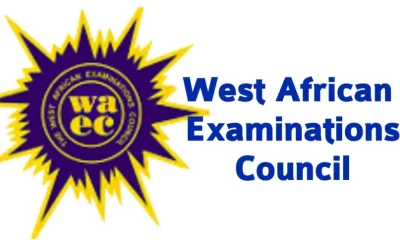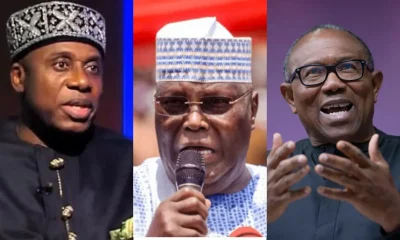Foreign
State of emergency declared as Ukraine launches raid into Russia

A state of emergency has been declared in the Kursk region of Russia, as a rare cross-border attack by Ukrainian troops continued on Wednesday.
The acting regional governor, Alexei Smirnov, said the move was necessary “to eliminate the consequences of enemy forces coming into the region”.
Russian officials said at least five civilians had been killed and 31 wounded, six of them children, since the start of the incursion.
Ukraine has not officially commented and the depth of the incursion remains unclear.
Why has Ukraine launched a cross-border attack on Russia?
On Tuesday morning, up to 1,000 Ukrainian troops, as well as 11 tanks and more than 20 armoured combat vehicles, entered Russia near the town of Sudzha, Moscow said.
Fighting reportedly took place in a number of villages throughout Tuesday, with local authorities urging residents to limit their movements and all public events cancelled.
A number of air alerts were issued in Kursk and footage posted online – verified by the BBC – showed fighter jets flying low over the region, with smoke rising from areas on the ground.
Thousands of people were evacuated from border areas and doctors were being drafted in from other cities, Mr Smirnov said.
Ukrainian incursions into Russian territory have been extremely rare since Russia launched its full-scale invasion in February 2022.
On Wednesday evening, Ukrainian MP Oleksiy Honcharenko said the Ukrainian army had established control over the Sudzha gas hub, a major gas facility involved in the transit of natural gas from Russia to the EU via Ukraine, which has continued despite the war.
It is the only point of entry for Russian gas into the EU.
Although the claim has not been verified by the BBC, Mr Honcharenko’s comment was the first confirmation of an incursion into Russian territory by a Ukrainian official.
Mr Honcharenko said on Facebook that while he did not know what the “plan” behind the incursion was, it would show “Europeans and Americans that… Russia can and needs to be attacked”.
Russia’s military response to the incursion will be one of Andrei Belousov’s first big leadership tests as the country’s new defence minister, after he replaced his long-serving predecessor Sergei Shoigu in May.
Speaking to the BBC’s Newshour, Mr Honcharenko added that “from a military point of view, we are trying to take back the initiative”.
“We are showing the world that the world should not be scared of escalation or the reaction of Putin. There is no reaction,” he said.
“For the first time since the Second World War, Russian territory that is internationally recognised is occupied and Putin did not [turn] to nukes and so on.”
He said the incursion would also force Russia to move troops to the region and hopefully decrease the number of attacks it can carry out in eastern Ukraine.
In a lukewarm reaction White House press secretary Karine Jean-Pierre said the US had no prior knowledge of the attack and that it planned to reach out to the Ukrainian military “to learn more about their objectives”.
Speaking on Wednesday, Ms Jean-Pierre said Washington will continue to ensure Kyiv has what it needs “to defend themselves against Russia’s aggression”.
‘Heavy’ fighting in Sudzha
In a televised meeting with government officials on Wednesday, Russian President Vladimir Putin accused Ukraine of launching a “major provocation” and “firing indiscriminately” at civilian buildings and residences.
Russia’s Chief of General Staff Valery Gerasimov said the “advance” into the Kursk region had been stopped, with Russian forces “continuing to destroy the adversary in areas directly adjacent to the Russian-Ukrainian border”.
Mr Gerasimov said Ukrainian forces aimed to take over the area around the town of Sudzha, and that Russia had already killed 100 men and injured another 215.
However, some popular and generally well-informed pro-war Telegram channels suggested the situation on the ground was not as stable as the Kremlin said.
Blogger Yuri Kotenok described the battles taking place in Sudzha and nearby Korenevo as “heavy”, while the channel Rybar said that the situation in the area around Sudzha was “continuing to deteriorate” and Ukrainian formations were advancing towards the town. The BBC is unable to verify these claims.
The influential pro-war Rybar Telegram channel went on to strongly criticise the highest ranks of the Russian military on Wednesday, saying that “for two months the full information was sent to the useless headquarters”, adding that there was enough time “to make an appropriate decision”.
Rybar’s concerns were echoed by several other pro-war bloggers, who are very popular with Russian readers. They often offer a more critical perspective of military developments than the Kremlin, without questioning whether or not the war is necessary.
The Russian National Guard said it had strengthened the security of the Kursk nuclear power plant, which lies some 70km (43 miles) north-east of Sudzha.
In its latest report, the Institute for the Study of War said geolocated footage from the past two days show that Ukrainian armoured vehicles have advanced to positions 10km into the Kursk region.
In the Belgorod region, which neighbours Kursk, Governor Vyacheslav Gladkov also issued missile attack warnings throughout Tuesday and said several people had been injured in Ukrainian air attacks.
Foreign
Trump deploys nuclear submarines in row with Russia

US President Donald Trump ordered the deployment of two nuclear submarines Friday in an extraordinary escalation of what had been an online war of words with a Russian official over Ukraine and tariffs.
Trump and Dmitry Medvedev, the deputy chairman of Russia’s security council, have been sparring on social media for days.
Trump’s post on his Truth Social platform abruptly took that spat into the very real — and rarely publicized — sphere of nuclear forces.
“Based on the highly provocative statements,” Trump said he had “ordered two Nuclear Submarines to be positioned in the appropriate regions, just in case these foolish and inflammatory statements are more than just that.”
“Words are very important, and can often lead to unintended consequences, I hope this will not be one of those instances,” the 79-year-old Republican posted.
Trump did not say in his post whether he meant nuclear-powered or nuclear-armed submarines. He also did not elaborate on the exact deployment locations, which are kept secret by the US military.
But in an interview with Newsmax that aired Friday night, Trump said the submarines were “closer to Russia.”
“We always want to be ready. And so I have sent to the region two nuclear submarines,” he said.
“I just want to make sure that his words are only words and nothing more than that.”
Trump’s remarks came hours after Russian President Vladimir Putin said Moscow had started mass producing its hypersonic nuclear-capable Oreshnik missile, and could deploy them to Belarus, a close Russian ally neighbouring Ukraine, by year-end.
The nuclear sabre-rattling came against the backdrop of a deadline set by Trump for the end of next week for Russia to take steps to ending the Ukraine war or face unspecified new sanctions.
Despite the pressure from Washington, Russia’s onslaught against its pro-Western neighbor continues to unfold at full bore.
An AFP analysis Friday showed that Russian forces had launched a record number of drones at Ukraine in July.
Russian attacks have killed hundreds of Ukrainian civilians since June. A combined missile and drone attack on the Ukrainian capital Kyiv early Thursday killed 31 people, rescuers said.
Putin, who has consistently rejected calls for a ceasefire, said Friday that he wants peace but that his demands for ending his nearly three-and-a-half year invasion were “unchanged”.
Those demands include that Ukraine abandon territory and end ambitions to join NATO.
Putin, speaking alongside Belarusian President Alexander Lukashenko, said Belarusian and Russian specialists “have chosen a place for future positions” of the Oreshnik missiles.
“Work is now underway to prepare these positions. So, most likely, we will close this issue by the end of the year,” he added.
The United States and Russia control the vast majority of the world’s nuclear weaponry, and Washington keeps nuclear-armed submarines on permanent patrol as part of its so-called nuclear triad of land, sea and air-launched weapons.
Trump told Newsmax that Medvedev’s “nuclear” reference prompted him to reposition US nuclear submarines.
“When you mention the word ‘nuclear’… my eyes light up. And I say, we better be careful, because it’s the ultimate threat,” Trump said in the interview.
Medvedev had criticised Trump on his Telegram account Thursday and alluded to the “fabled ‘Dead Hand’” — a reference to a highly secret automated system put in place during the Cold War to control the country’s nuclear weapons.
This came after Trump had lashed out at what he called the “dead economies” of Russia and India.
Medvedev had also harshly criticized Trump’s threat of new sanctions against Russia over its war in Ukraine.
Accusing Trump of “playing the ultimatum game,” he posted Monday on X that Trump “should remember” that Russia is a formidable force.
Trump responded by calling Medvedev “the failed former President of Russia, who thinks he’s still President.”
Medvedev should “watch his words,” Trump posted at midnight in Washington on Wednesday. “He’s entering very dangerous territory!”
Medvedev is a vocal proponent of Russia’s war — and generally antagonistic to relations with the West.
He served as president between 2008-2012, effectively acting as a placeholder for Putin, who was able to circumvent constitutional term limits and remain in de facto power.
The one-time reformer has rebranded over the years as an avid online troller, touting often extreme versions of official Kremlin nationalist messaging.
Foreign
Plane crash kills 49 passengers in Russia

A passenger plane carrying nearly 50 people crashed in a remote spot in Russia’s far eastern region of Amur on Thursday, with no immediate signs of survivors, authorities said.
The aircraft, a twin-propeller Antonov-24 operated by Angara Airlines, was headed to the town of Tynda from the city of Blagoveshchensk when it disappeared from radar at around 1:00 pm local time (0400 GMT).
A rescue helicopter later spotted the burning fuselage of the plane on a forested mountain slope about 16 kilometres (10 miles) from Tynda.
Videos published by Russian investigators showed what appeared to be columns of smoke billowing from the wreckage of the plane in a dense, forested area.
Rescuers in the helicopter saw no evidence of survivors, local rescuers said, as the Amur region’s civil defence agency said it was dispatching a ground team to the scene.
Aviation experts say Russia’s air defense fire likely caused Azerbaijan plane crash as nation mourns
“At the moment, 25 people and five units of equipment have been dispatched, and four aircraft with crews are on standby,” it said.
The forest terrain has made getting to the site difficult, a rescuer told the state TASS news agency.
“The main search operations are being conducted from the air,” they said.
Angara Airlines, a small regional carrier based in the Russian city of Irkutsk, made no immediate public comment.
Plane attempted ‘second landing’
The plane was carrying 43 passengers and six crew members on board, according to the region’s governor Vassily Orlov.
Among the passengers were five children, he said.
Russia’s state TASS news agency, citing emergency services, said the plane was carrying 40 passengers and six crew.
The plane crashed while attempting a second approach to Tynda airport, Russia’s Far Eastern Transport Prosecutor’s Office said.
“While approaching Tynda Airport, the aircraft went around for a second landing, after which contact was lost,” it said.
“The circumstances are being investigated,” it said.
It did not make any immediate comment on what caused the crash.
The state TASS news agency reported that the plane was manufactured almost 50 years ago.
“In 2021, the aircraft’s airworthiness certificate was extended until 2036,” it reported, citing a source in aviation services.
AFP was not able to immediately verify this information.
The Antonov-24 is a popular, Soviet-designed twin-propeller plane that first entered into service in 1959.
Russia has taken steps to switch from Soviet aircraft to modern jets in recent years, but ageing light aircraft are still widely used in far-flung regions, with accidents frequent.
FRANCE 24 with AFP
Foreign
US to withdraw from UNESCO, gives reason

The United States announced on Tuesday that it will withdraw from UNESCO, the United Nations Educational, Scientific and Cultural Organization (UNESCO).
This is the latest move by the Trump administration to reduce US participation in international organizations.
The withdrawal will take effect at the end of next year, according to the State Department and reflects President Trump’s deep mistrust of multilateralism and institutions tied to the United Nations.
“Continued involvement in UNESCO is not in the national interest of the United States,” said Tammy Bruce, a State Department spokeswoman.
Bruce accused the organization of promoting “divisive social and cultural causes.”
She also criticized UNESCO’s emphasis on the UN’s Sustainable Development Goals, calling them “a globalist, ideological agenda for international development at odds with our America First foreign policy.”
UNESCO, based in Paris, has had a long and often tense relationship with the U.S.
In 2011, the United States stopped funding the organization after it granted full membership to Palestine.
That decision, required by US law, cut nearly 20% of UNESCO’s budget and forced it to slash programs.
In 2017, during Trump’s first term, the US announced its withdrawal, citing anti-Israel bias. It remained a nonmember observer.
The Biden administration rejoined in 2023, arguing that US absence had allowed China to expand its influence within the agency.
In February, President Trump signed an executive order to review US funding to UN agencies, including UNESCO.
At the time, White House staff secretary Will Scharf said UNESCO showed an “anti-American bias.”
UNESCO is best known for designating World Heritage sites. It has recognized over 1,200 locations since 1972.
These include Palmyra in Syria, the Minaret of Jam in Afghanistan, Petra’s Treasury in Jordan, and several US national parks.
It also maintains a list of “intangible cultural heritage,” including the French baguette and opera singing in Italy.
UNESCO runs education programs and promotes literacy, sex education, clean water, and women’s equality.
It also helps set global standards in areas like ocean protection and artificial intelligence ethics.
The US decision signals a renewed shift away from global cooperation under Trump’s leadership.
(Tribune Nigeria)
Foreign
Gaza death toll nears 57,700 as Hamas release 10 captives

At least 57,680 Palestinians have been killed in Israel’s genocidal war on the Gaza Strip since October 2023, the besieged enclave’s Health Ministry said Wednesday.
A ministry statement said that 105 bodies were brought to hospitals in the last 24 hours, with 530 people injured, taking the number of injuries to 137,409 in the Israeli onslaught.
“Many victims are still trapped under the rubble and on the roads as rescuers are unable to reach them,” it added.
Israel resumed attacks on the Gaza Strip on March 18 and has since killed 7,118 victims and injured 25,368, shattering a ceasefire and prisoner exchange agreement that took hold in January.
Last November, the International Criminal Court issued arrest warrants for Israeli Prime Minister Benjamin Netanyahu and his former Defense Minister Yoav Gallant for war crimes and crimes against humanity in Gaza.
Israel also faces a genocide case at the International Court of Justice for its war on the enclave.
Hamas to free 10 captives
Hamas official Taher al-Nunu said the group is prepared to free 10 abductees to ensure the unhindered flow of desperately needed aid into Gaza and stop Israeli attacks.
Al-Nunu said the group agreed to the latest truce proposal and “offered the necessary flexibility to protect our people, stop the crime of genocide, and allow the free and dignified entry and flow of aid to our people until we reach a complete end to the war”.
Negotiations are under way on two key issues: the unfettered entry of aid and “mechanisms” aimed at the forced displacement of Palestinians, he added.
Israeli troop withdrawal lines in the first phase of a ceasefire should be drawn up in a way that does not affect Palestinian lives and “paves the way for the second phase of negotiations”.
Europe not doing enough to stop genocide – Spain
Spanish Prime Minister Pedro Sanchez on Wednesday accused Israel of committing genocide in Palestine and said Europe is not doing enough to try to stop it.
“No one that tramples on the EU’s founding principles – or that uses hunger and war to annihilate a legitimate state – can be a partner of the European Union,” he said.
Speaking before the Spanish parliament, Sanchez criticized Israeli Prime Minister Benjamin Netanyahu’s government, saying its actions would be remembered “as one of the darkest episodes of the 21st century.”
“The horrifying images of children searching for their families under rubble, or dying of hunger in tents, should not only move us and shame us – they should compel the international community, and Europe in particular, to act,” he added.
He said Spain and Ireland first requested the EU to assess Israel’s compliance with the EU-Israel Association Agreement in February 2024.
“We had to push hard for that analysis to be carried out,” he added.
Sanchez said the EU’s special representative presented the report to foreign ministers on June 23, concluding that there were “more than sufficient indications” that Israel had violated Article 2 of the agreement, which links cooperation with respect for human rights.
While the EU has not taken any action against Israel, Sanchez said Spain is pushing for the immediate suspension of the agreement.
“What we denounce (Russian President Vladimir) Putin for doing in Ukraine, we cannot allow Netanyahu to do in Palestine,” he added.
DailyTrust
Foreign
Elon Musk: ‘Trump is ingrate’, without me he would have lost the election

Elon Musk, the tech mogul, has announced the formation of ‘America Party’, a new political party in the United States.
Musk made the declaration on Saturday, a day after asking his followers on X whether a new political party should be created.
“By a factor of 2 to 1, you want a new political party, and you shall have it!” he wrote on X.
“When it comes to bankrupting our country with waste & graft, we live in a one-party system, not a democracy.
“Today, the America Party is formed to give you back your freedom.”
Musk’s desire to “reform” the American political system began brimming after his fallout with President Donald Trump over the contentious “Big Beautiful Bill”.
Trump eventually signed the bill Friday afternoon after it passed both chambers of the congress.
The bill includes tax cuts, spending boosts for defence, and an immigration crackdown.
But to pay for the tax cuts and the spending, the bill includes cuts to critical social services, including medicaid, a government health insurance programme for low-income households.
Trump said Musk contested the bill because it affected an electric vehicle (EV) mandate that could affect the sales of electric cars.
But the Tesla chief executive officer (CEO) dismissed the claims.
During his final days as Trump’s adviser, Musk said he was disappointed with the bill.
His comments triggered a public exchange of words with the president on social media.
Musk said the US president showed ingratitude, given that without his help, “Trump would have lost the election”.
The president warned that there would be “serious consequences” if Musk funded Democratic candidates to run against Republicans who would vote in favour of the legislation.
As the US senate debated Trump’s contentious “Big, Beautiful Bill” on Monday before a final vote, Musk threatened that those in favour of the proposal would lose their primary next year.
Foreign
Fresh crisis hits U.S as Europe boycott ‘Made in American’ products

For motorcycle lovers in Sweden, Harley-Davidson is the hottest brand on the road. Jack Daniel’s whiskey beckons from the bar at British pubs. In France, Levi’s jeans are all about chic.
But in the tumult of President Donald Trump’s trade war with Europe, many European consumers are starting to avoid U.S. products and services in what appears to be a decisive and potentially long-term shift away from buying American, according to a new assessment by the European Central Bank.
In April, Trump imposed a 10% blanket tariff on America’s trading partners and threatened “reciprocal tariffs” on many of those, including the European Union. Companies like Tesla and McDonald’s are seeing customers in Europe put off by “Made in America.”
“The newly imposed U.S. trade tariffs on European products are causing European consumers to think twice about what’s in their shopping cart,” the ECB wrote in a blog post about its research on consumer behavior. “Consumers are very willing to actively move away from U.S. products and services.”
Europeans Test Grassroot Boycotts
Europeans had already begun testing grassroots boycotts on American products, including Heinz ketchup and Lay’s potato chips, shortly after Trump took office. His threats to take over Greenland, part of Denmark, energized Danes to organize no-buy campaigns on Facebook. Tesla owners in Sweden slapped “shame” bumper stickers on their cars to distance themselves from Elon Musk, the Tesla CEO who is one of Trump’s top advisers.
But Europeans’ anguish over Trump’s treatment of America’s longtime allies has hardened as he has moved to rewire world trade with steep global tariffs, the central bank found.
Trump took particular aim at the European Union, which he called “very, very bad to us” for not buying more from the United States, and threatened the bloc with a 20% “reciprocal” tariff last month. Such talk bewildered many Europeans and rattled EU leaders, who retaliated with a 25% duty on many U.S. goods.
Both sides called a temporary truce after Trump abruptly reversed course and delayed tariffs until the summer. But the 10% baseline tariff is still in place, and a trans-Atlantic trade war could easily flare again.
And even if a trade deal is reached, Europe’s newfound wariness of its longtime ally will not easily be unwound. The ECB study found that even if a mere 5% tax was placed on American products sold in Europe, Europeans would be inclined to shun them.
What is new, the central bank said, is a “preference” among European consumers “to move away from U.S. products and brands altogether,” no matter what the cost. That was the case even for households that could bear the brunt of higher prices.
“Even though they could afford more expensive U.S. products and services, they consciously choose alternatives,” the bank said. “This suggests that consumers’ reactions may not just be a temporary response to tariff increases, but instead signal a possible long-term structural shift in consumer preferences away from U.S. products and brands.”
App Tells Consumers if Product Is American
In Germany and Italy, developers have created apps that scan grocery and clothing items for people who want to make sure they are not buying American. The top app, BrandSnap, even suggests European alternatives.
On a French-run “Boycott USA!” Facebook channel with 31,000 members, people boast about buying Adidas, a German brand, over Nike and New Balance, and post stories about avoiding travel to the United States.
In a Danish Facebook group with 95,000 members, people try to help each other figure out if products like Gillette Mach 3 razor blades or Schweppes soda are from the United States. One run from Sweden promotes alternatives to Airbnb and is calling for a European boycott on Meta platforms for a week in May.
Europeans have also posted online to say they have begun canceling subscriptions to U.S. streaming giants, including Netflix, Disney+ and Amazon Prime Video.
Some consumers who have boycotted Amazon have gone online to lament that delivery from alternate e-commerce platforms in their countries is slower or less reliable but say that they are staying the course.
Millions of people still buy American goods and services worldwide, but U.S. companies and investors are keeping a close eye on international markets for signs of anti-American sentiment related to Trump’s policies.
In Europe, Tesla sales continued a sharp decline in April, data showed, including an 81% plunge in Sweden from a year earlier, as protests against Musk’s political views held steady.
And McDonald’s said it was observing growing negative attitudes abroad toward U.S. brands, especially in Northern Europe and Canada.
International consumers are “going to be cutting back their purchase of American brands, and we’ve seen an uptick in anti-American sentiment,” the burger chain’s CEO, Chris Kempczinski, said in a call with analysts last week.
The McDonald’s brand does not seem to have been damaged yet — same-store sales in Canada and Europe were down only 1% in the first quarter from a year earlier. But there is an “8- to a 10-point increase in anti-American sentiment,” he said.
This article originally appeared in The New York Times.

 News2 weeks ago
News2 weeks agoWAEC sets release date for May\ June exam results

 Worship2 weeks ago
Worship2 weeks agoCCC Liberation choir hosts maiden Cantata, musical instrument launch

 News2 weeks ago
News2 weeks ago2027: Fresh Prophecy Revealed On FCT Minister Wike

 Spotlights2 weeks ago
Spotlights2 weeks ago2027: ‘I saw you on a mountain, standing alone’ – Fresh prophecy on Akwa Ibom governor emerges

 Spotlights2 weeks ago
Spotlights2 weeks agoREVEALED: Why Tinubu prefers Nentawe Yilwatda to Al-Makura, Dalori as APC Chairman

 Profile2 weeks ago
Profile2 weeks agoCoalition: Tensions rise in ADC as Atiku faces pressure to withdraw presidential candidacy

 Sports2 weeks ago
Sports2 weeks agoRashford to be denied dream welcome at Barcelona, reason emerges
















